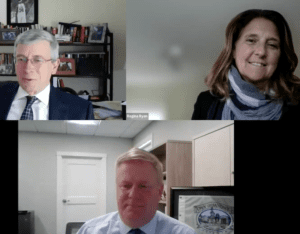Who is a member?
Our members are the local governments of Massachusetts and their elected and appointed leadership.

An MMA webinar discussed the implications of a recent Supreme Judicial Court ruling that a public comment policy, or “civility restraint,” violates free speech rights. Speakers included (clockwise from top left) Attorney John Davis, Attorney Regina Ryan and Sandwich Town Manager George “Bud” Dunham.
An MMA webinar today discussed the implications of a recent Supreme Judicial Court ruling that a public comment policy, or “civility restraint,” violates free speech rights.
Sandwich Town Manager George “Bud” Dunham opened the session by discussing the erosion of decorum and civility, and “a general level of disrespect,” that has been witnessed by those involved in local government, as well as all walks of life.
“I know one of the concerns we all share is, how will this type of behavior impact public service moving forward, whether it’s attracting employees or retaining good ones,” Dunham said. “It’s getting harder, not easier, to work in public service and municipal government.”
In an effort to shield themselves from disrespectful behavior and to set an example, many local boards and committees had formally adopted codes of conduct and rules of decorum in recent years, Dunham said, but the SJC decision “changed the rules of engagement.”
“We’re still trying to decipher how this case is impacting our operations,” he said. “The court and the state have not issued any guidance on this yet.”
Attorney John Davis of Pierce Davis & Perritano offered an overview of the case, Barron v. Kolenda, in which he represented the town of Southborough on behalf of MIIA. He said the case arose for a public participation policy adopted by the Southborough Board of Selectmen in 2017 that required speakers at public meetings “to act in a professional and courteous manner.” He said some of the text of the policy was drawn from state law, including the open meeting law. Nonetheless, the policy was challenged in court as a preemption of constitutional rights.
The SJC ruled that boards may not restrict the speech of participants “based solely on the viewpoint or message of a speaker or the board’s desire to avoid criticism.” Ultimately, the court ruled, “although civility can and should be encouraged in political discourse, it cannot be required.”
Characterizing the decision, Davis said, “You can’t mandate civility. You can’t mandate order. You can’t mandate decorum.”
Davis shared advice for navigating public participation going forward. Municipal officials may enforce time limits on public comment sessions and enforce time limits on individual speakers, though such rules must be enforced universally, without prejudice. A municipality may also adopt rules “preventing speakers from disrupting others,” he said. “Disruption,” he added, is related to how someone says something, not what they say.
Further, municipal officials may require that speech be “peaceable and orderly,” meaning, for example, that someone can’t shout objections spontaneously from the back of the room without being recognized.
Attorney Regina Ryan of Discrimination and Harassment Solutions, the author of a standard of code of conduct for municipal boards and committees, reviewed updates to the guidelines. She said changes to Section IV, “Guidelines for Individuals Speaking at Public Meetings,” will help municipal officials proceed in the current environment.
To maintain an orderly and peaceable meeting, she said, public participation periods can have a time constraint, and members of the public may speak only with the permission of the chair.
Ryan emphasized that municipal officials can encourage public meeting attendees to maintain order and civility and to refrain from making any personal or profane remarks. Public participants can be further encouraged to respect the views and opinions of others (including members of the public body and the general public) and to treat others as the speaker wishes to be treated.
Dunham moderated 30 minutes of questions and answers, where panelists addressed inquiries about slanderous statements made about non-municipal persons, threats of violence or discriminatory language, and applications of the ruling to remote meetings.
In a follow-up MMA webinar on June 12, Katie Gilfeather, an employee assistance program clinician with AllOne Health, will share practical tips for de-escalating public anger.
• Barron v. Kolenda: Overview & Lessons presentation (70K PDF)
• MIIA Code of Conduct Guidelines for Town Boards and Committees (317K PDF)